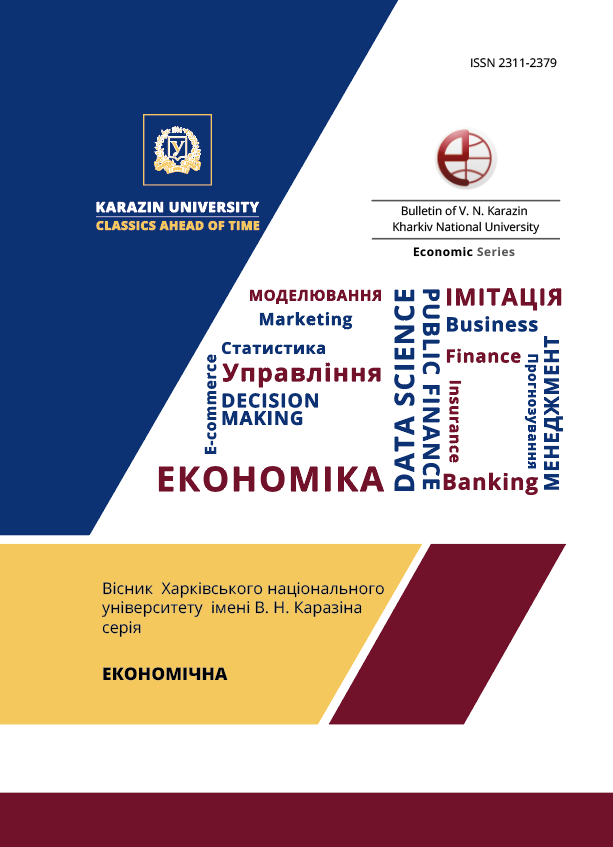Tax instruments of local budget revenue regulation
Abstract
The decentralization of finance in the context of reform of local self-government in Ukraine needs the improvement of the tax system i.e. the optimal allocation of taxes between the local and state budgets. The purpose of this research is to enhance the existing experience of budget decentralization with the identification of the practical results of the decentralization reform and its impact on the local territorial communities in Ukraine. The article examines and summarizes the current experience of budget decentralization in Ukraine and the results of the reform, as well as their community impact. The main focus of the study is on the principles of tax policy implementation in terms of taxes and fees credited to local budgets. The purpose of the study is to optimize the tax mechanisms for filling local budgets in Ukraine. The article examines the state of filling local budgets and its impact on socio-economic development of the community. It is determined that the basis of revenues are tax revenues, the share of which is growing every year. The reform resulted in increased interest of local governments in increasing revenues to local budgets, finding reserves to fill them, improving the efficiency of administration of taxes and fees. Thus, the main budget-forming tax is the personal income tax, which in the amount of 60 percent is credited to the budgets of rural, township, urban territorial communities. In its turn, the positive dynamics is the reduction of intergovernmental transfers. Increasing the dependence of local budgets on personal income tax and own local taxes is a positive consequence of the implemented budget reform. According to the results of the study, the directions of optimizing the use of tax instruments in filling local budgets are substantiated. One of the crucial conditions for creating a highly developed market economy is the formation of local self-government as an effectively functioning part of the public sector.
Downloads
References
Radelitsky, Yu. & Kvasniy, O. (2018). Local budgets in the conditions of decentralization: theoretical aspects. Socio-economic problems of the modern period of Ukraine, 5, 147-153. (in Ukrainian)
On the budget system of Ukraine: Law of Ukraine № 512-XII of December 5, 1990, expired on July 24, 2001, ground - 2542-III. Retrieved from https://zakon.rada.gov.ua/laws/show/512-12#Text. (in Ukrainian)
Budget Code of Ukraine. № 2456-VI of July 8, 2010, current version of September 29, 2021, basis - 1727-IX. Retrieved from https://zakon.rada.gov.ua/laws/show/2456 - 17 # Text. (in Ukrainian)
Kovalevych, D. (2014). Local budgets and their role in territorial development. Bulletin of the Chernivtsi Trade and Economic Institute: Economic Sciences, 2, 198-203. (in Ukrainian)
Sydor, I. & Karpyshyn, N. (2020). Local taxation in Ukraine in the context of financial support of public services. Efektyvna ekonomika, 9. doi: https://doi.org/10.32702/2307-2105-2020.9.56. (in Ukrainian)
Sukach, O. & Lutsenko, N. (2017). Budget decentralization in Ukraine: problems and prospects. Bulletin of the Eastern European University of Economics and Management: scientific journal, 2(23), 120-128. (in Ukrainian)
Budget declaration for 2022-2024: Resolution of the Cabinet of Ministers of Ukraine of May 31, 2021 № 548. Retrieved from https://www.kmu.gov.ua/npas/pro-shvalennya-byudzhetnoyi-deklaraciyi-na-20222024-t310521. (in Ukrainian)
Openbudget (2021). State web portal of the budget for citizens. Retrieved from https://openbudget.gov.ua/national-budget/incomes. (in Ukrainian)
The main financial indicators of communities - experts have created a dashboard. Retrieved from https://decentralization.gov.ua/news/13835?page=3. (in Ukrainian)
How local budgets were implemented in 2020–expert analysis. Retrieved from https://decentralization.gov.ua/news/13249?page=2. (in Ukrainian)
Chudaeva, I., & Sukach, O. (2019). Modern management approaches to the financial security of the region under budgetary decentralization. Baltic Journal of Economic Studies, 5(4). doi: https://doi.org/10.30525/2256-0742/2019-5-4-227-235.
Monitoring of local self-government reform and territorial organization of powe.r Retrieved from https://decentralization.gov.ua/uploads/library/file/755/07.10.2021.pdf. (in Ukrainian)
Chugunov, I. and at (2018). Budget and tax policy in the system of regulation of the economy: monograph. Kyiv: Globe-Press. (in Ukrainian)
Sidenko, V. and at (2017). Institutional transformation of the financial and economic system of Ukraine in the conditions of globalization. Kyiv: Kyiv. nat. trade and economy University. (in Ukrainian)
Koroviy, V. (2020). Tax Revenues as a Component of Local Budgets Revenues. BUSINESSINFORM, 3, 328-336. DOI: https://doi.org/10.32983/2222-4459-2020-3-328-336. (in Ukrainian)
Luchyshyn, L. (2019). A role of taxes and collections in profits of local budgets. Management and Entrepreneurship in Ukraine: the stages of formation and problems of development, 1(2), 61-69. doi: http://doi.org/10.23939/smeu2019.02.061 (in Ukrainian).
Koval, V. & Sukach, O. (2021). Filling local budgets: tax innovations. II International Tax Congress, November 26, 2021 Irpin. (in Ukrainian)

